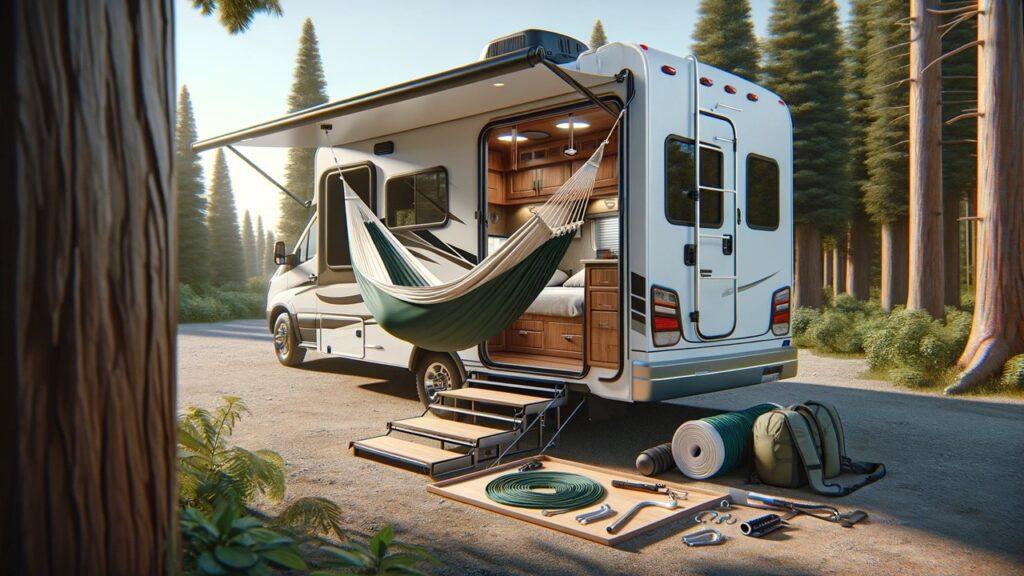
RV living is an exciting blend of adventure and simplicity, offering the freedom to explore new places while enjoying the comforts of home. However, along with the joys of life on the road come certain challenges, one of the most often overlooked being noise. The constant hum of traffic, the clatter of appliances, and the occasional campground chatter can significantly impact your comfort. Understanding and managing these decibel levels is crucial for maintaining a pleasant RV experience. How Decibel Levels Impact Comfort in RV Environments is an essential topic for any RV enthusiast. By effectively controlling noise, you can ensure a peaceful and enjoyable journey, making the most of your time on the road.
Understanding Decibel Levels
Diving into the world of RV living, it’s essential to recognize that comfort isn’t just about plush seats and a cool breeze. Noise levels play a pivotal role, and understanding how decibel levels impact comfort in RV environments can drastically enhance your experience. Decibels (dB) measure the intensity of sound, offering a numerical representation of what we hear. By grasping how these levels are quantified and recognizing common noise sources, you can better manage your environment for ultimate comfort.
Basics of Sound and Decibels
Sound travels in waves, and decibels reflect their power. Not all sounds are created equal—some are barely a whisper, while others rival a heavy traffic roar. Knowing how decibels relate to sound intensity helps us appreciate the scale from a rustling leaf to a blaring horn. For example, a whisper typically measures around 30 dB, normal conversation about 60 dB, and city traffic can exceed 85 dB. This comparison brings clarity to the everyday sounds in an RV setting.
Measuring Decibel Levels in RVs
To take control of your auditory surroundings, start by measuring the noise levels with tools like sound meters. Walk through your RV and take readings in various spots—this will help you pinpoint problematic areas. Understanding these readings can guide you in implementing noise reduction strategies effectively.
Sources of Noise in RV Environments
As we delve deeper into how decibel levels impact comfort in RV environments, identifying sources of noise becomes crucial. Both the world outside your RV and the activities within can disrupt your peace, affecting everything from your mood to your sleep quality.
External Sources of Noise
Outside, the bustling world doesn’t quiet down just for your retreat. Traffic noise can be incessant near highways, and even remote campgrounds buzz with the sounds of nature and fellow campers. From the howling wind to the patter of rain on the roof, these elements remind us that nature has its own soundtrack.
Internal Sources of Noise
Inside your RV, everyday conveniences can become sources of irritation. Appliances like RV quiet air conditioners and RV portable generators often contribute a significant hum. Even structural nuances—the creak of an aging frame or the subtle vibration of a running engine—add to the indoor soundscape. Not to forget, the lively chatter and movements of your travel companions can escalate the noise level.
Understanding and managing decibels is key to enhancing comfort in RV environments. From the hum of an air conditioner to the rustle of leaves outside, every sound contributes to the overall experience. Implementing noise reduction strategies and choosing the right equipment, like RV quiet air conditioners or RV solar generators, can transform a noisy mobile home into a serene sanctuary. Whether you’re parked in a bustling city or nestled in a quiet forest, remember that managing sound is not just about reducing noise but enhancing the quality of your adventures on the road.
The Influence of Noise on Comfort and Health
Noise transcends mere irritation; it profoundly affects our well-being. Understanding the impact of decibel levels on comfort within RV settings entails acknowledging its effects on both physical health and mental equilibrium. Prolonged exposure to high noise levels can precipitate significant health issues, ranging from auditory impairment to cardiovascular complications. Furthermore, persistent noise can corrode mental health, fostering heightened stress levels and diminishing life satisfaction.
Physical Health Ramifications
Excessive noise manifests immediate consequences, notably hearing impairment. The RV lifestyle often underestimates the risk of permanent hearing loss due to prolonged exposure to high decibel levels. Additionally, noise-induced sleep disruptions are prevalent, leading to compromised sleep quality and associated health ramifications such as heightened blood pressure and cardiovascular ailments. Given the vital role of sleep in overall well-being, any disturbance therein can set off a chain reaction of bodily repercussions.
Mental Well-being Impacts
The psychological toll of noise is equally profound. Sustained noise levels can trigger stress and anxiety, impeding one’s ability to unwind and savor their surroundings. Reduced relaxation and enjoyment frequently plague RV enthusiasts grappling with noise pollution. Moreover, noise can impede cognitive functions, hindering concentration and productivity. These consequences underscore the imperative of effectively managing noise to safeguard mental well-being while on the move.
Strategies to Reduce Noise in RVs
Fortunately, there are effective strategies to mitigate noise in your RV, enhancing comfort and health. Understanding how decibel levels impact comfort in RV environments is just the first step; implementing practical solutions is crucial. From soundproofing techniques to advanced noise-canceling technologies, various methods can significantly reduce noise levels inside your RV.
Practical Tips and Modifications
Soundproofing your RV is a highly effective way to minimize noise. Use materials like acoustic panels and weather stripping to block external noise. Strategic placement of furniture and equipment can also help; for instance, placing heavy furniture against thin walls can dampen sound. Regular maintenance is essential to reduce noise, ensuring that all parts are tightly secured and lubricated to prevent creaks and vibrations.
Technological Solutions
Embracing technology can further enhance your RV’s quietness. Noise-canceling devices and technologies, such as noise-canceling headphones or sound machines, can create a more serene environment. Upgrading to quieter appliances, like RV quiet air conditioners, can make a noticeable difference. Additionally, using white noise machines or apps can mask unwanted sounds, helping to create a peaceful atmosphere.
Managing noise effectively is crucial for maintaining comfort and health in RV environments. By understanding how decibel levels impact comfort in RV environments, you can take proactive steps to mitigate these impacts. Whether through practical modifications or technological upgrades, there are numerous strategies to ensure a quieter, more enjoyable RV experience. Prioritize noise reduction to enhance both your physical health and mental well-being, ensuring that every journey is as comfortable and peaceful as possible.
Choosing RVs and Equipment for a Quieter Environment
Selecting the right RV and equipment is crucial for creating a quieter and more comfortable environment. Understanding how decibel levels impact comfort in RV environments can guide you in making choices that minimize noise. From the materials used in construction to the appliances installed, every aspect of your RV can contribute to a peaceful living space. Here, we’ll explore the features to look for in RVs and recommend specific appliances and equipment that help reduce noise.
Features in RVs for Noise Reduction
When choosing an RV, consider the insulation and construction materials. High-quality insulation not only keeps your RV warm in winter and cool in summer but also dampens outside noise. Look for RVs with dense, high-grade insulation in the walls, ceiling, and floors. Additionally, construction materials play a significant role. Solid, well-constructed frames and panels reduce vibrations and noise transmission.
The layout and design of your RV also matter. Opt for a floor plan that places noise-sensitive areas, like bedrooms and living rooms, away from the noisiest spots, such as the engine and generator compartments. Built-in noise-reducing features, such as double-glazed windows and thick, cushioned flooring, can further enhance the quietness of your RV. These features collectively ensure a quieter interior, significantly improving your comfort.
Recommended Appliances and Equipment
To further control how decibel levels impact comfort in RV environments, invest in appliances and equipment designed for low noise. Start with quiet air conditioners and generators. These are essential for maintaining a comfortable temperature without the constant hum that typical models produce. Look for units specifically marketed as “quiet” or “low-noise.”
In the kitchen, low-noise appliances can make a big difference. Quiet refrigerators, microwaves, and dishwashers help maintain a peaceful atmosphere. For climate control, consider installing quiet fans and heating systems. These appliances are designed to operate efficiently without generating excessive noise, contributing to a serene environment inside your RV.
Maintenance and Upkeep for Noise Control
Once you’ve selected the right RV and equipment, maintaining them properly is essential to ensure continued noise control. Regular maintenance helps prevent minor issues from becoming significant problems, ensuring your RV remains a quiet and comfortable space. Let’s explore some routine checks and maintenance tips, as well as how to address noise issues promptly.
Routine Checks and Maintenance Tips
Conduct regular inspections of seals and insulation. Over time, seals around windows and doors can wear out, allowing noise to seep in. Replace worn seals and add extra insulation where needed to keep external noise at bay. Tighten loose parts and fixtures regularly, as these can cause rattling and vibrations while driving or during appliance operation.
Lubricating moving parts is another crucial step. Hinges, slides, and mechanical components should be regularly oiled to prevent squeaks and creaks. This not only reduces noise but also extends the lifespan of your RV’s components, ensuring smooth operation.
Addressing Noise Issues Promptly
Identifying the source of noise is the first step in addressing it. Pay attention to where and when you hear noise, then investigate those areas. Quick fixes for common noise problems include securing loose items, using weather stripping, and applying soundproofing materials. For more complex issues, such as persistent mechanical noise, seek professional help to avoid further damage.
Understanding how decibel levels impact comfort in RV environments involves ongoing attention and care. By performing regular maintenance and addressing issues promptly, you can maintain a quiet, comfortable living space, enhancing your overall RV experience.
Creating a quiet RV environment involves selecting the right vehicle and equipment and maintaining them effectively. By understanding how decibel levels impact comfort in RV environments, you can make informed choices that enhance your comfort and well-being. Whether through strategic purchases or diligent maintenance, these efforts contribute to a peaceful and enjoyable RV lifestyle. Keep your space serene and comfortable, and you’ll fully enjoy the adventures that RV living offers.
Wrapping It Up!
Reflecting on our exploration of how decibel levels affect comfort in RV settings, it becomes evident how profoundly noise can influence our physical and mental well-being. From grasping the fundamentals of sound and decibels to practical techniques for minimizing noise in your RV, each facet significantly enhances the quality of RV living.
The management of noise extends beyond mere quietness; it encompasses safeguarding health and promoting relaxation. Undoubtedly, controlling noise levels within your RV holds paramount importance. It directly impacts sleep quality, alleviates stress, and cultivates a more serene living environment. Through the adoption of discussed strategies, such as selecting appropriate RV features and equipment and adhering to regular maintenance routines, noise can be substantially reduced.
In your pursuit of a quieter RV experience, the consistent application of these suggestions is imperative. Investing in noise-reducing appliances, integrating soundproofing materials, and maintaining your RV diligently are investments that yield enduring benefits. A quieter RV fosters not only immediate comfort but also cultivates a healthier, more pleasurable lifestyle on the road.
Grasping the implications of decibel levels on RV comfort marks the initial stride towards an enhanced RV journey. By proactively addressing noise concerns, you ensure that your adventures are not just enjoyable but also conducive to well-being. Embrace these practices, and witness your RV transform into a sanctuary of tranquility, poised to accompany you on countless peaceful excursions.
Related FAQs
How do I measure decibel levels in my RV?
Use a decibel meter or a smartphone app to measure sound levels accurately inside your RV.
What are acceptable decibel levels for comfort in an RV?
Aim for sound levels below 50 dB for optimal comfort, similar to a quiet suburb.
Can noise-canceling headphones help in an RV?
Yes, noise-canceling headphones can reduce unwanted noise and improve comfort.
Do RV parks have noise regulations?
Many RV parks have quiet hours, typically from 10 PM to 7 AM, to ensure a peaceful environment.
What materials are best for soundproofing an RV?
Use dense insulation, weather stripping, and thick curtains to effectively soundproof your RV.
As outdoor enthusiasts ourselves, we understand the significance of reliable gear that can withstand the elements and support you throughout your journey. We try to provide as much real life information with our guides and how tos to the readers as possible. Our honest and transparent reviews of essential outdoor gadgets and products are rooted in testing and experience. We take great satisfaction in offering unbiased evaluations, ensuring that you can make informed decisions when investing in outdoor gear. As an affiliate website, we may earn a small commission from some of the products we feature. However, rest assured that our opinions are not influenced by this, and your trust is always our top priority.



